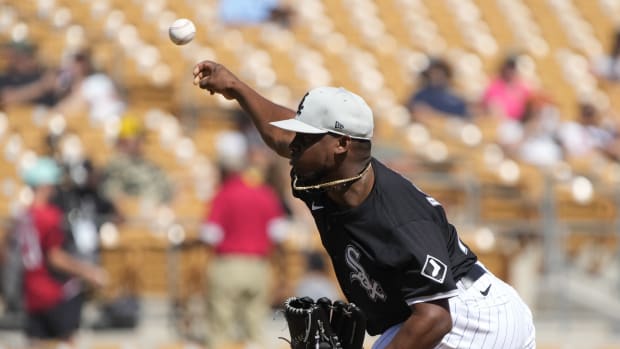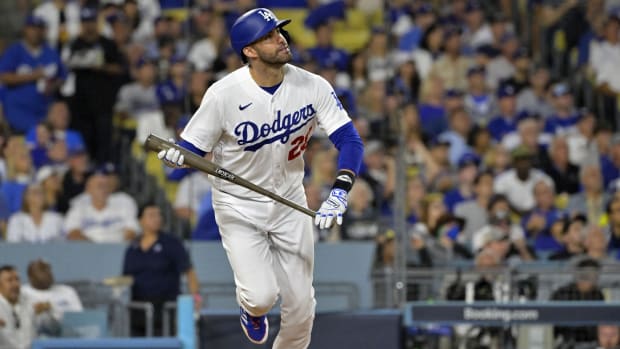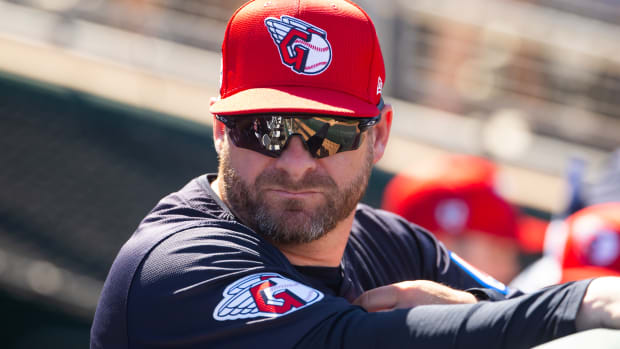Why Red Sox Had to Move on From Alex Cora
Baseball has been embedded in the soul of Alex Cora since he was a child, falling asleep on the floor of the press box of Yldefonso Sola Morales Stadium in Caguas, Puerto Rico, where his dad covered winter ball as a newspaper columnist and served as a scout for the Rangers and Padres. Suddenly, at the age of 44, Alex Cora is not just the former manager of the Red Sox, he also is about to be disowned by the game he loves.
All because the opportunity to cheat was too available, too enticing.
In releasing a statement as part of the “mutual parting”–code for getting in front of his suspension, if not likely firing–Cora let the emotions seep into his words. He called the two years managing the Red Sox “the best years of my life.” And in saying goodbye to Boston, he said, “There is nothing like it in all of baseball, and I will miss it dearly.”
It’s worse than that. He will miss baseball, that part of his soul that always has nourished him. You have to remember commissioner Rob Manfred did not just suspend Hinch for a season. He also barred Hinch during that period from setting foot in any spring training, Major League or minor league facility and from traveling for the club, which would be a ban even against scouting amateur talent. That’s the definition of persona non grata in baseball.
Cora is looking at the same fate, only longer. As a player, broadcaster, coach and manager, Cora has been around professional ballparks for a quarter of a century, his entire adult life.
The minute Red Sox owner John Henry and his front office finished reading Manfred’s nine-page statement on the Houston sign-stealing scandal they knew Alex Cora could not and would not manage their team any longer. In influence and volume, no named person is more connected to the 2017 Astros’ cheating schemes than Cora.
The commissioner suspended Hinch for a season for failing to act–a crime of omission. Hinch was then fired by Astros owner Jim Crane.
Cora was a mastermind and major participant in what went down in Houston. He ordered a video room technician to install near the dugout a monitor that showed a constant feed from a centerfield camera. He developed the trash can system. He used the dugout phone to call the replay room to get the signs himself.
Cora was looking at serving more time than Hinch–and that was before the commissioner finishes his investigation into allegations that Cora, as manager of the 2018 Red Sox, presided over another scheme to misuse technology to decode signs.
The Red Sox will move on. They’ll find another manager. Maybe it’s Ron Roenicke, the bench coach and a former major league manager who holds great respect in that clubhouse. That would be the easiest of transitions. Or maybe the new general manager, Chaim Bloom, rightfully will say, “Wait a minute. Rather than just inheriting something in house, I deserve the right to launch a full-scale search to find my best choice as manager–the one I want for the next five to seven years.”
We knew the Red Sox were staring at a major transition, what with Mookie Betts hitting free agency at the end of this season, boatloads of money tied up in an aging, oft-injured pitching staff and a payroll they prefer to be trimmed. That transition just got bigger.
The game survives stars and scandals. It goes on. But what of Alex Cora? What becomes of him and his love of baseball? Today he is too toxic to think that another club someday with let him manage their team. Over much time, and in proving himself in jobs of lesser responsibility, he can earn back that chance, if he wants it.
Think about how Cora was hired as Houston’s bench coach for the 2017 season. He had spent four years in the broadcast booth after he retired, while also serving as a general manager in the Puerto Rico Winter League for five offseasons. He also held the dual role of manager/GM for two of those seasons but fired himself as manager because “I didn’t have fun doing it.” He grew too intense.
The Astros threw him right into the role of bench coach, rather than a base coach. And with that competitive fire in him–there probably was still too much player in him–Cora went rogue. Remember, Cora had never played or coached under the expanded replay system. Suddenly he was a bench coach in a dugout with a full-time camera feed from centerfield and monitor that at his command could be placed within steps of the dugout. He fell and he fell hard.
He also wanted to help his good friend, Carlos Beltran, the pro’s pro who everybody respected in the clubhouse. And if Beltran, in his final season, was frustrated about hitting .234 almost two months into the season, well, Cora could help with that.
The 2017 Astros, cheating “throughout the postseason,” as Manfred wrote, won the World Series. Nobody said anything. Their methods not only worked but also they stayed unknown. So why when Cora was named to manage the Red Sox would he have stopped a similar scheme? (Remember, the 2017 Red Sox already had their own cheating scam on the books.) The 2018 Red Sox won the World Series.
In a span of nine days it all fell apart–the Astros’ reputation, the jobs of Hinch and Houston general manager Jeff Luhnow, the Red Sox’ 2020 plans, the place in his beloved game for Cora.
It began with a phone call.
A week ago Monday night, Manfred telephoned Henry. Reporters from The Athletic had called Manfred that day for a statement about a story they were preparing to run: that the Red Sox stole signs with the help of technology in 2018. Manfred wasn’t officially done with the Houston investigation, though he was about to wrap it up. He knew where he was going with it before the holidays but waited for that time to pass before dropping such bad news. He went on vacation himself.
It was his first day back in the office when The Athletic called. Manfred already knew about the 2018 Red Sox issue. It was the Astros who first alerted him to their scheme during the course of that three-month investigation. Manfred and his investigators planned to pursue the charge privately. But he knew The Athletic story pushed it into the public.
And so he called Henry to inform him essentially, “You’re next.” He told Henry he should expect the same level of thoroughness his office had just brought to the Houston investigation.
“Turning over e-mails?” Henry asked.
“Everything.”
That same night Crane telephoned Henry, owner-to-owner, to give him an idea of what he was in for.
The next day Manfred announced he was investigating the 2018 Red Sox. That investigation is expected to last one or two months, not three. The difference is with Houston, Manfred had multiple years and multiple infractions to chase. Boston is only about 2018.
As for the 2018 postseason, protocol suddenly changed. The 2017 postseason had no safeguards against using the replay monitor or replay room to steal signs. By the 2018 postseason, cheating was so rampant that the commissioner’s office received complaints from “a number of teams” about “a number of teams” that were cheating. Paranoia ruled. So Manfred ordered MLB security agents to guard the replay monitor and the runway between the clubhouse and the monitor. I remember being in Milwaukee for Game 1 of the NLCS and the players and coaches remarking about the strangely intense level of security.
Cora seemed to make every right move in the 2018 postseason and in the rare case when he didn’t–sticking with Eduardo Rodriguez too long in World Series Game 4–he admitted it, bringing it up himself unsolicited. He was beloved, not only for winning the World Series as a manager but also emerging as someone fans could root for.
When Dave Dombrowski offered Cora the job in Boston, Cora said he would take it on one condition: that the Red Sox provide planeloads of relief help for the people of Puerto Rico suffering in the aftermath of Hurricane Maria.
The job and the platform are gone now, lost to the temptation of technology. Hinch, 45, and Cora, 44, are likable, smart, savvy men with families. Not only did they win back-to-back World Series, they became templates on what a modern manager should be in the age of empowered young players and a data-driven game.
The irony is that keeping that strong bond with their players and technology itself undid them. Hinch couldn’t bring himself to risk upsetting his clubhouse culture when his most important, revered players had gone down the path of cheating. Cora made it happen.
They once defined the state of the art in managers. Now they are exiled. It happened so quickly, in these nine days that shook the baseball world.




































